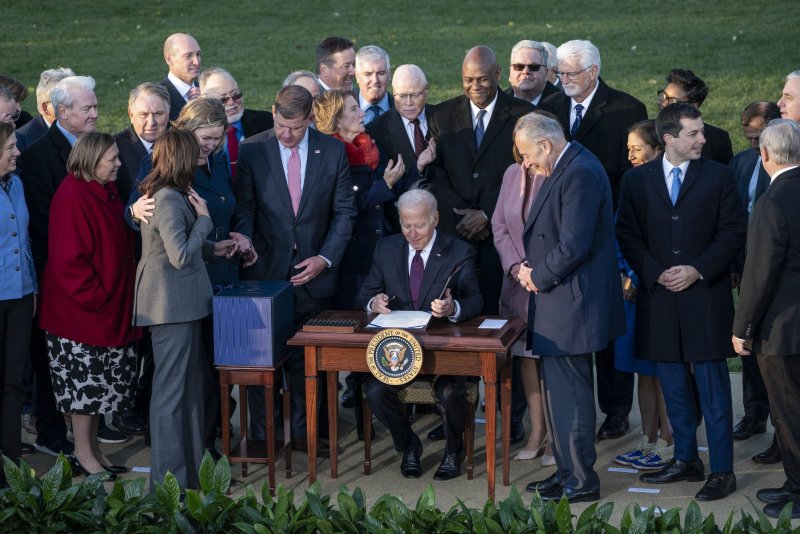President Joe Biden signs the bipartisan "Infrastructure Investment and Jobs Act" into law on the South Lawn of the White House on November 15. Photo by Sarah Silbiger/UPI |
License Photo
Centuries ago, the first American settlers gave thanks for their survival. Today, too many politicians are offering thanks for not having to confront or answer otherwise frighteningly direct questions about America and its role in the world.
When pluralistic societies fear addressing tough questions that challenge the basic foundations for those societies, some things are very wrong and rotten -- not only in Denmark, as Shakespeare wrote. Things are rotten here.
Last week, Kyle Rittenhouse was acquitted by a jury of his peers of killing two fellow citizens and badly injuring a third with his assault rifle in Kenosha, Wis. What was a then-17-year-old doing crossing state lines with an AR-15 he was legally barred from buying but not carrying is one such question that cowers politicians, lest they become embroiled in arguments about the Second Amendment and the right to bear and carry arms?
Congress finally passed the $1.9 trillion infrastructure bill. For all the debate over that bill, two critical questions will not even be raised. First, who on the Hill read the bill before it was passed and knows what was in it before voting? The answer is no one.
The CEO of a public company who acted in the same manner in signing any financial or corporate statement without knowing its contents would be breaking the Sarbanes-Oxley Law requiring business leaders to certify under pain of prosecution that all the material and financial statements were fully accurate. Why is Congress not held to that standard? No one can answer that question.
Second, who is in charge of overseeing that the funding approved in that bill will be used effectively, efficiently and honestly, free of corruption and waste? Nominally the Secretary of Transportation, national economic adviser Brian Deese and former New Orleans Mayor Mitch Landrieu are in charge. But are they really?
Further, what authority do they have to ensure spending is coordinated across states so a road or bridge built by one does not end at the state line? No one. Indeed, appointing an organization such as the Army Corps of Engineers with real technical expertise would have been far better as an Army logistician leading Operation Warp Speed was critical in fielding three COVID-19 vaccines in a staggeringly short record time.
Foreign policy and international relations are no better served. One of the few issues on which Democrats and Republicans agree is that China is a peer competitor, adversary and, some argue, an enemy. But what are the real as opposed to potential threats China actually poses to its neighbors and to the United States? Name a few. Further, if China is a competitor, where and especially how is America to compete, given that some of our and Europe's largest banks and corporations regard the Middle Kingdom as ripe for investment and profitable business?
Nor has anyone asked if a tariff war with China makes any sense as inflation rises and it is the American taxpayer who is picking up the tab for these cost increases. While the U.S. government seems more concerned than the Taiwanese about the threat of a Chinese military invasion, how many forces would be needed to achieve that task? No one asks that question. And the answer is about twice the number of soldiers and ships that landed at D-Day on Normandy on June 6, 1944.
Russian troops are massing on Ukraine's borders. Some in the Pentagon are predicting a likely invasion in early winter. But has anyone asked Russia what its intentions are and why its troops seem to be threatening an attack?
Last, and most perplexing, why, instead of rallying the nation, are crises dividing us further? The attack on Pearl Harbor brought the nation together. And even the Great Depression did not lead to the divisions and polarization wrought by COVID-19 so far killing more Americans than died in wars and conflicts since Gen. Robert E. Lee surrendered at Appomattox in 1865. Why?
Are the reasons for politicians failing to confront tough questions products of cynical and hypocritical politics no longer reflecting truth and fact when political power is at stake? Or is it political cowardice? The answers should frighten America.
Harlan Ullman is senior adviser at Washington's Atlantic Council, the prime author of "shock and awe" and author of the upcoming book, "The Fifth Horseman and the New MAD: How Massive Attacks of Disruption Became the Looming Existential Danger to a Divided Nation and the World at Large."
The views and opinions expressed in this commentary are solely those of the author.















